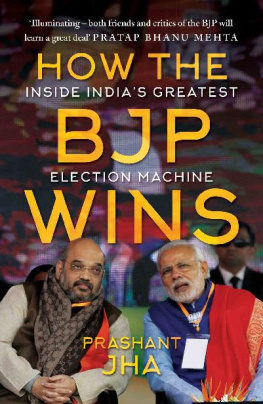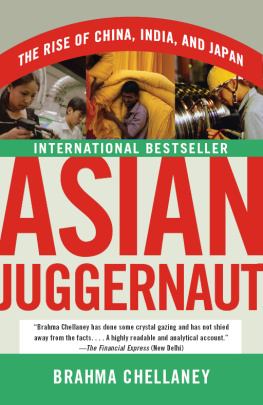

2011 Carnegie Endowment for International Peace
All rights reserved. No part of this publication may be reproduced or transmitted in any form or by any means without permission in writing from the Carnegie Endowment.
Carnegie Endowment for International Peace
1779 Massachusetts Avenue, N.W., Washington, DC 20036
Phone: + 202 483 7600 Fax: + 202 483 1840
CarnegieEndowment.org
The Carnegie Endowment does not take institutional positions on public policy issues; the views represented here are the authors own and do not necessarily reflect the views of the Endowment, its staff, or its trustees.
To order, contact Carnegies distributor:
Hopkins Fulfillment Service
PO Box 50370, Baltimore, MD 21211-4370
Phone: + 1 800 537 5487 or + 410 516 6956 Fax: + 410 516 6998
Library of Congress Cataloging-in-Publication Data
Dadush, Uri B.
Juggernaut : how emerging markets are reshaping globalization / Uri Dadush and William Shaw.
p.cm.
Includes bibliographical references and .
ISBN 978-0-87003-262-2 (cloth) ISBN 978-0-87003-261-5 (pbk.) 978-0-87003-343-8(e-book) 1. International economic relations. 2. Developing countriesEconomic conditions21st century. 3. GlobalizationEconomic aspects. 4. GlobalizationPolitical aspects. 5. International tradeHistory21st century. 6. International financeHistory21st century. 7. Economic history21st century. 8. Economic forecasting. I. Shaw, William, 1953. II. Title.
HF1359.D33 2011
337.091724dc22
2011011645
Cover Design by Jocelyn Soly
CONTENTS
THE POOR SHALL INHERIT THE EARTH
A SHORT HISTORY OF DEVELOPMENT
A WORLD TRANSFORMED
THE GREAT DEVELOPMENT ARENA
HARNESSING THE BEAST
THE NEGLECTED PILLAR OF GLOBALIZATION
A TWENTY-FIRST CENTURY TRAGEDY?
WILL THE CONTINENT BREAK THROUGH?
THE NEED FOR A GLOBAL CONSCIENCE
THE MODEL UNDERPINNING THE LONG-TERM PROJECTIONS
The rapid rise of what we used to call the developing world is a defining trend of our time. In this book, Uri Dadush and William Shaw provide the first systematic examination of the long-term implications of this tectonic shift for the international economy and global governance, covering both domestic and international economic policies.
Two centuries of history show that there is nothing automatic about economic development and catch-up. In recent years, however, an extraordinary confluence of factors has allowed an unprecedented number of countriesand peopleto achieve rapid income growth. These factors include access to technology, the opening up of markets, stabilized macroeconomic conditions, higher savings and investment rates, and effective government interventions to support private-sector development.
A realistic assessment suggests that this combination may persist in coming decades, but only if the global community mitigates a number of significant risksclimate change, geopolitical breakdown, financial crisis, and protectionism chief among them. If these risks are contained, the next forty years are likely to see extraordinary changes. By 2050, Chinas economy will be almost twice the size of the U.S. economy (in PPP terms), India will be the worlds third largest economy, and no European country will be among the top eight largest economies.
Dadush and Shaw assess the impact of this shift along the four main lines of international economic interaction: trade, finance, migration, and the global commons. They ask: How will the rise of developing countries transform these four arenas? How should domestic policies adapt? How should international diplomacy respond to the changes? What role will be played by international coordination mechanisms, including international organizations and bilateral and multilateral treaties?
Despite rapid growth in the emerging powerhouses, their populations will remain significantly poorer than those of the advanced countries. By 2050, 6 of the 10 largest global economies will have per capita incomes far below Japan, the United States, and developed Europe. The dramatic differences in living standardsas well as in social values and political systemsamong the major economies will greatly complicate reaching global agreements.
For better or for worse, the management of these historic forces will remain in the hands of sovereign nationsparticularly the largest economies. Thus, global agreementsto mitigate climate change, expand the gains from migration, and avert financial crises, for examplewill require increased awareness and appreciation within these countries and their polities of how their fate is inextricably linked to global developments.
International organizations and negotiations will play a large role, but the authors caution against excessive dependence on global agreements. The issues are far too complex and the potential divergences far too large for 200-odd countries to be able to agree on everything. Instead, the authors propose that countries rely increasingly on agreements among a critical mass of players on specific issues, with provisions to later include a broader group.
The rise of developing countries is an enormous opportunity to bring hundreds of millions of people out of poverty and dramatically increase the prosperity of rich countries as well. But as with any political-economic shift of this magnitude, there will be deep uncertainties, frictions, and the need for far-reaching policy changes. Individual countries as well as the global polity will have to develop the capacity to understand how things are changing and how fast, to adapt and to mediate the substantial conflicts that will arise. The first step is understanding, and for that Dadush and Shaw have provided an invaluable guide.
Jessica Tuchman Mathews
President, Carnegie Endowment for International Peace
The authors are indebted to numerous people for their help over the past two years. Most important, this book would never have seen the light of day without the dedication of Shimelse M. Ali, Vera Eidelman, and Bennett Stancil from the Carnegie Endowment for International Peace. Their persistence in ferreting out data, improving our written style, and contributing numerous pieces of analysis greatly enriched the final product, and their good humor in performing all of these tasks eased the process considerably.
We are grateful to Jessica Mathews and Carnegie management for their understanding and support, and for furnishing the resources required to complete this work. We received extremely useful comments on earlier drafts from several astute observers of the international economic scene, including Kemal Dervis, Alejandro Foxley, George Kalan, Andrew Mold, and Moiss Nam. Nida Jafrani and Evelina Yeghiyan kept the office running smoothly. Ilonka Oszvald ably took care of production, making it all seem easy though were sure it wasnt. And Bruce Ross-Larson helped enormously to improve the clarity and logical structure of the finished manuscript. Finally, this would have been an immeasurably more difficult, and much drearier, experience without the help and support of our wives, Gilda Dadush and Anne Vorce, and families.
| ASEAN | Association of Southeast Asian Nations |
| CBO | Congressional Budget Office |







